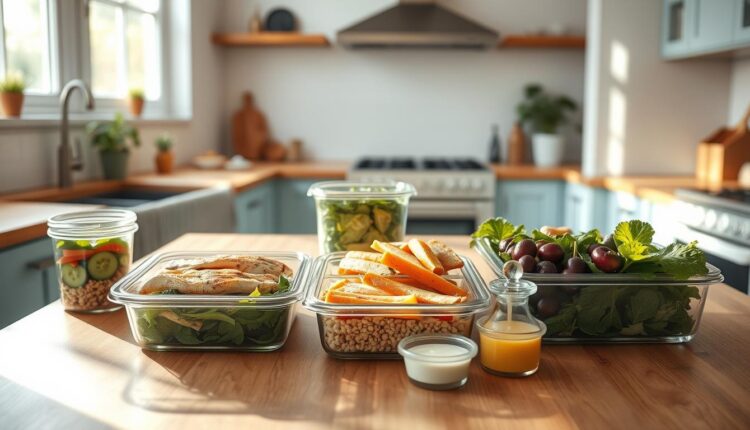Lunch Meal Prep Weekly Rotation Never Repetitive
Transform your lunches with our lunch meal prep weekly rotation guide. Learn how to plan and prep delicious, varied meals in advance
Busy schedules often turn midday nourishment into an afterthought. But what if you could transform this daily necessity into something you genuinely look forward to? The secret lies in a strategic approach that balances variety with practicality.
After working with hundreds of home cooks through Prepistry, I’ve seen how intentional planning creates lasting change. One office manager told me her team now crowds around the break room fridge every Monday, eager to see her colorful Buddha bowls and zesty wraps. This isn’t about perfection—it’s about designing a system that works harder so you don’t have to.
Here’s what we’ll uncover together:
- How to build flavor-packed options that stay exciting all week
- Smart ingredient swaps to keep nutrition high and boredom low
- Time-saving techniques from batch cooking to freezer hacks
You’ll discover how simple tools like compartmentalized containers and strategic prep days can turn rushed decisions into moments of genuine enjoyment. Let’s create midday breaks worth savoring.
Understanding the Fundamentals of Meal Prepping
The secret to stress-free eating lies in a well-structured weekly plan. Meal prepping isn’t about rigid rules—it’s creating flexible building blocks that adapt to your schedule. Think of it as chess strategy for your kitchen, where each move sets up three delicious possibilities.
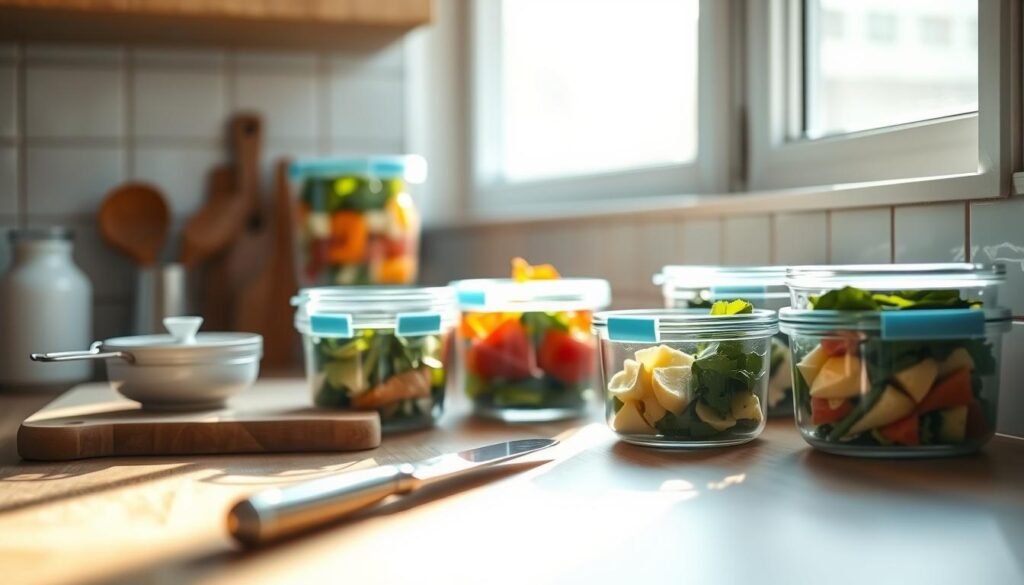
Key Concepts Behind Weekly Rotation
Batch cooking transformed my client Mark’s routine. He now roasts two sheet pans of veggies Sundays—half become Buddha bowl bases, the rest get blended into soups. This “cook once, use twice” approach cuts active kitchen time by 40%.
Successful systems rely on three pillars:
- Strategic ingredient prep (washed greens, pre-cut stir-fry veggies)
- Flavor foundations (simmered sauces, spice blends)
- Mix-and-match proteins (shredded chicken, marinated tofu)
The Impact of Meal Prepping on Your Daily Routine
Sarah, a nurse I coach, reduced her 7 PM “what’s for dinner?” panic by planning five core ingredients each week. Her roasted sweet potatoes starred in breakfast hashes, lunch grain bowls, and evening tacos. This method slashed her food waste by 60%.
A well-crafted calendar turns chaotic mornings into smooth transitions. Designate days for:
- Protein prep (Sunday)
- Veggie washing (Wednesday)
- Leftover remix (Friday)
Your freezer becomes a flavor library—portion chili into muffin tins for instant baked potato toppers. With practice, these habits create mental space for what truly matters beyond the kitchen.
Mastering the Lunch Meal Prep Weekly Rotation
The rhythm of your week hinges on reliable systems that adapt to life’s surprises. When my client Jenna first started planning midday nourishment, she thought variety meant seven entirely different recipes. Now she thrives with three core components that transform throughout the week.
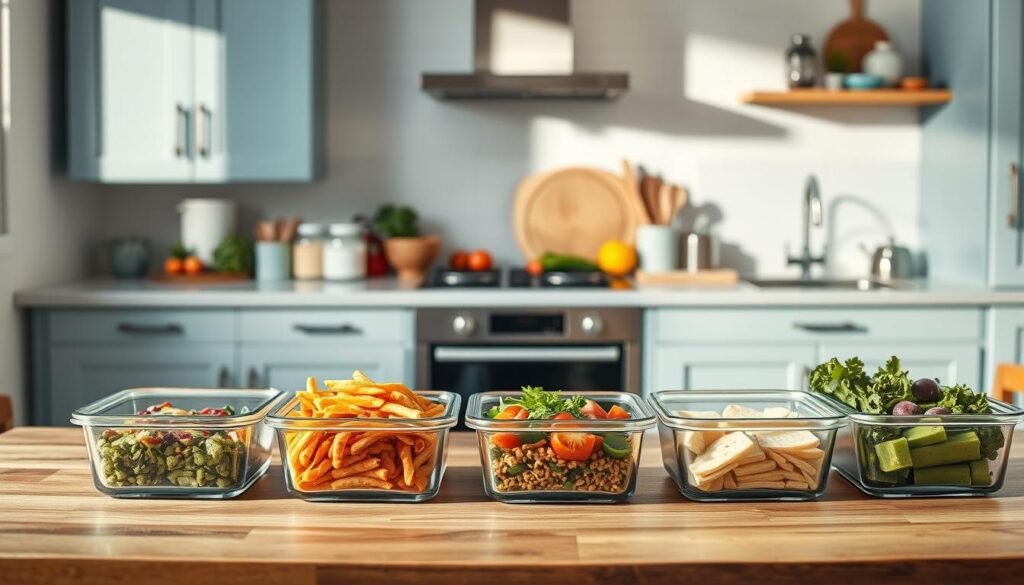
Why Consistency is Essential
Building confidence begins with repetition. Batch-cook six chicken breasts Sunday—shred two for tacos, slice three for grain bowls, cube the rest for stir-fries. This approach helped Jenna reduce decision fatigue while keeping flavors fresh.
Key benefits of steady routines:
- Faster assembly with pre-prepped ingredients
- Reduced waste through strategic repurposing
- Space for creativity within structured parameters
Simple Steps to Build Your Rotation
Start with proteins and grains that multitask. Quinoa becomes Monday’s Mediterranean salad base, Wednesday’s stir-fry bed, and Friday’s soup thickener. Pair with roasted veggies that work in wraps or grain bowls.
Three foundational practices:
- Cook double portions of versatile bases (like dairy-free breakfast prep staples)
- Designate Thursday for “remix night” to refresh remaining ingredients
- Use compartmentalized containers for easy customization
One parent told me their secret: “I write three sauce options on sticky notes each Sunday—it lets everyone build their perfect bowl.” Small tweaks create big engagement without extra work.
Creative Meal Planning Strategies
Your kitchen becomes an artist’s studio when you approach nourishment with playful curiosity. Food52’s test kitchen director notes:
“The best menus balance comfort with discovery—like pairing familiar roasted potatoes with zesty lime crema.”
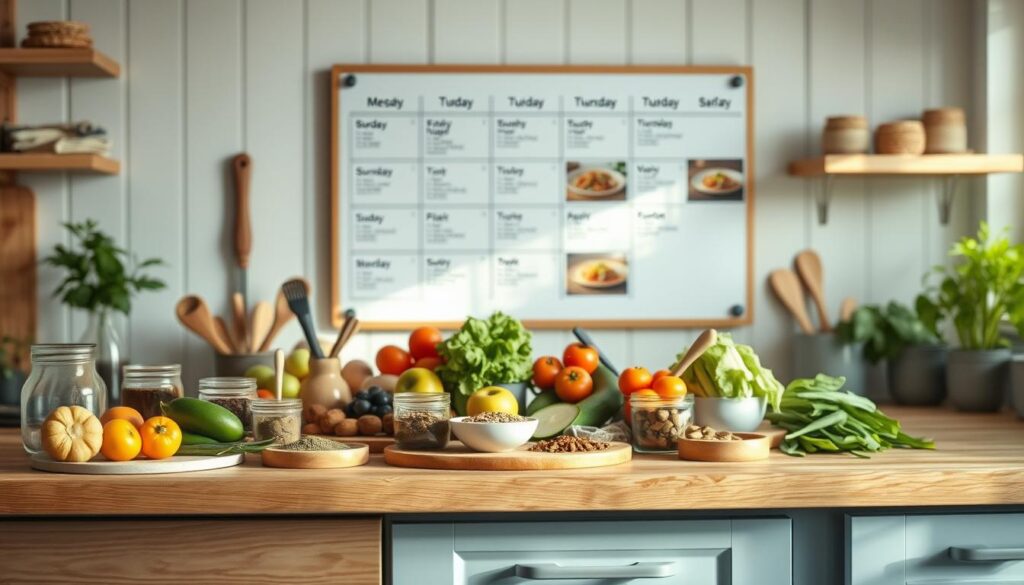
Designing a Weekly Menu That Excites
Start by listing three trusted favorites and two new recipes each week. Last spring, I challenged clients to reinvent chicken salads using seasonal twists—one family raved about their mango-avocado version with toasted pepitas. Textural contrasts keep things lively: pair crunchy cucumber ribbons with creamy hummus bowls, or top hearty chili with crispy tortilla strips.
Seasonal produce naturally guides variety. Summer might mean grilled zucchini ribbons in grain bowls, while fall invites roasted squash into power salads. Keep a “flavor spark” list on your fridge—mine includes quick upgrades like chili crisp drizzle or quick-pickled onions.
Utilizing a Meal Plan Calendar
Visual mapping prevents flavor burnout. Use colored markers to designate themes: purple for Mediterranean nights, green for veggie-forward dishes. A client shared her genius hack: “I slot dinner leftovers as next-day lunch bases—Tuesday’s herb-roasted chicken becomes Wednesday’s curry salad.”
Digital tools like Paprika app help track ingredient lifespans. Schedule Thursday as “remix day” to transform remaining avocado into creamy dressings or blend wilting greens into pesto. Remember: planning sessions shouldn’t exceed 20 minutes—set a timer and trust your culinary intuition.
Diverse Recipe Ideas for Lunch and Dinner
Your midday and evening nourishment should spark joy, not déjà vu. One client recently shared her breakthrough: “I realized roasted chicken could become three entirely different experiences—warm grain bowls, chilled wraps, or shredded tacos.” This mindset shift unlocks endless possibilities.
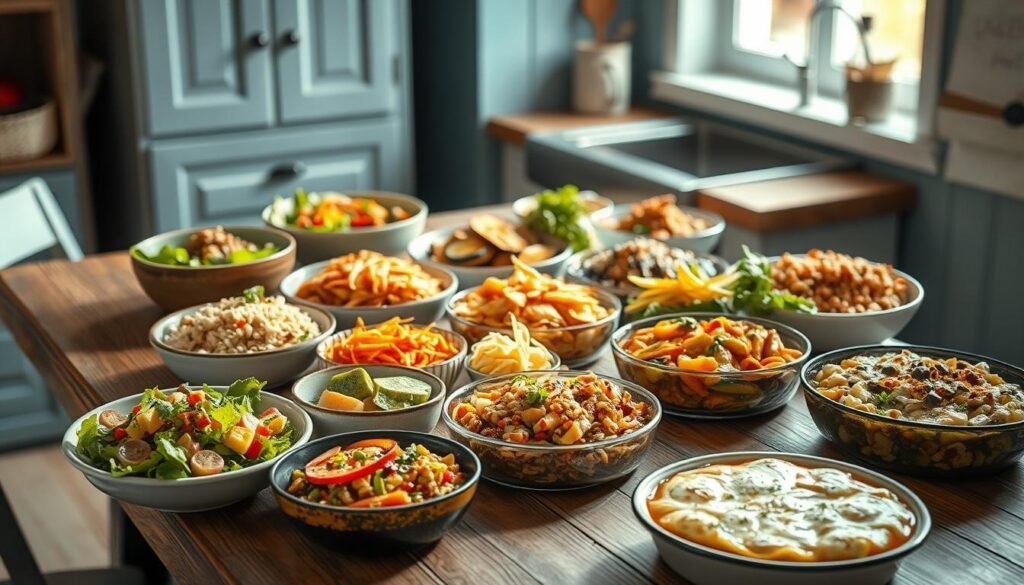
Flavorful Foundations
Start with versatile bases. Batch-cook brown rice on Sunday—Monday’s sesame-ginger stir-fry becomes Wednesday’s burrito filling when mixed with black beans. Try sheet-pan roasted sweet potatoes: pair with quinoa for power bowls or blend into creamy soups.
Three winning combinations:
- Lemon-herb chicken + farro + charred broccoli
- Spiced chickpeas + couscous + roasted carrots
- Teriyaki salmon + jasmine rice + snap peas
Leftover Reinventions
Last night’s dinner becomes today’s star. Transform extra grilled chicken into a vibrant salad with mango, avocado, and lime dressing. Blend roasted veggies into frittatas or fold into whole-grain wraps with hummus.
A client’s genius hack: “I freeze leftover chili in silicone molds—they’re perfect baked potato toppers.” Try these upgrades:
“Add crunch to reheated grains with toasted nuts or crispy chickpeas—it’s like hitting the refresh button on flavors.”
Remember, variety thrives in simplicity. Keep dressings and spices bold, and let ingredients shine through thoughtful pairings.
Smart Grocery Shopping and Ingredient Prep
Your grocery cart holds the keys to stress-free mornings and inspired midday nourishment. Food52’s test kitchen team notes:
“A focused shopping trip begins with ingredients that multitask like culinary chameleons.”
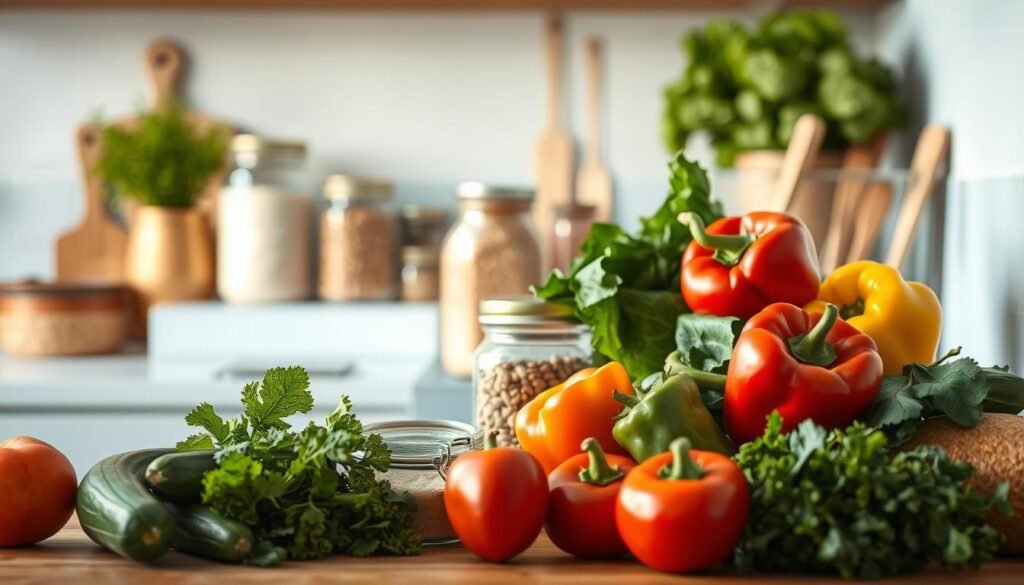
Crafting a Focused Grocery List
Start with your meal plan’s core components. List proteins first—chicken thighs work in tacos, salads, and soups. Then build around seasonal veggies that serve multiple roles. A client recently shared her game-changer: “I group my list by recipe sections rather than store aisles—it cuts impulse buys by half.”
| Ingredient | Breakfast | Lunch | Dinner |
|---|---|---|---|
| Sweet potatoes | Hash browns | Buddha bowls | Stuffed skins |
| Chickpeas | Savory oatmeal | Salad toppers | Curry base |
| Spinach | Smoothies | Wrap filler | Stir-fry greens |
Choosing Versatile and Fresh Ingredients
Snapware containers become your fridge’s best friend. Store washed greens in airtight bins with paper towels to absorb moisture—they’ll stay crisp all week. Batch-roast two sheet pans of veggies Sunday night: broccoli for grain bowls, peppers for fajitas, zucchini for pasta tosses.
Three pantry heroes every kitchen needs:
- Frozen edamame (instant protein boost)
- Quinoa (heats in 90 seconds)
- Tahini (creates dressings and dips)
Remember: strategic shopping isn’t about restriction. It’s about building a flavorful toolkit that adapts to your week’s rhythm. One parent told me their secret—”I keep sliced apples and single-serve nut butter packs visible for grab-and-go snacks.” Small shifts create big wins.
Efficient Kitchen Techniques and Time Management
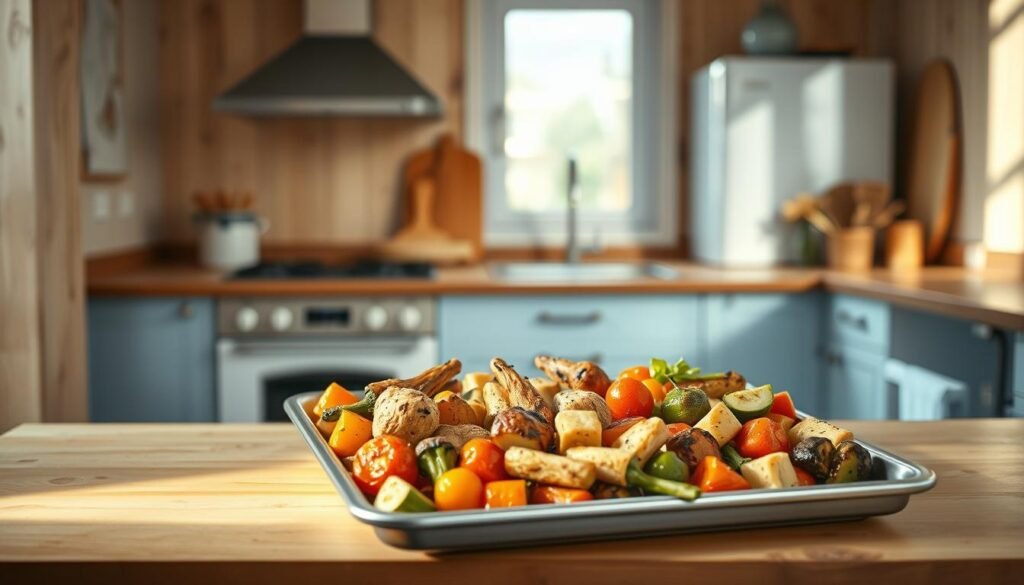
Your kitchen becomes a time-saving workshop when you adopt professional cooking strategies. I learned this watching restaurant chefs orchestrate multiple dishes simultaneously—a skill we can adapt for home kitchens. Let me show you how to work smarter, not harder.
Batch Cooking Blueprint
Sunday afternoons transformed for my client Sarah when she started roasting two sheet pans of chicken and veggies. The golden rule: cook once, eat thrice. Her lemon-herb chicken became Monday’s grain bowls, Wednesday’s wraps, and Friday’s fried rice.
| Dish | Base Ingredients | 3 Meal Uses |
|---|---|---|
| Roasted Veggies | Bell peppers, zucchini, onions | Frittatas / Pasta / Flatbreads |
| Shredded Pork | Pork shoulder, spices | Tacos / Soup / Stuffed potatoes |
| Quinoa | Grain, broth | Salads / Stir-fries / Breakfast bowls |
Set up an assembly line: season proteins on one cutting board while veggies roast. Use divided baking sheets to prevent flavor mixing. One parent told me their hack: “I line pans with foil—zero scrubbing later!”
Smart Timing Tactics
Coordinate cooking stages like a pro. Start grains simmering, then slide sheet pans into the oven. While those cook, blend sauces in your blender. This overlapping approach cuts active kitchen time by 30%.
Three keys to stress-free prep:
- Portion proteins before marinating (use labeled bags)
- Chop veggies by texture—crunchy items last
- Store components separately for easy mixing
Remember: efficiency isn’t about speed. It’s creating systems that give you evenings back. As one teacher shared: “I now relax while my roasted sweet potatoes and chicken become tomorrow’s meals.”
Container Solutions and Storage Tips
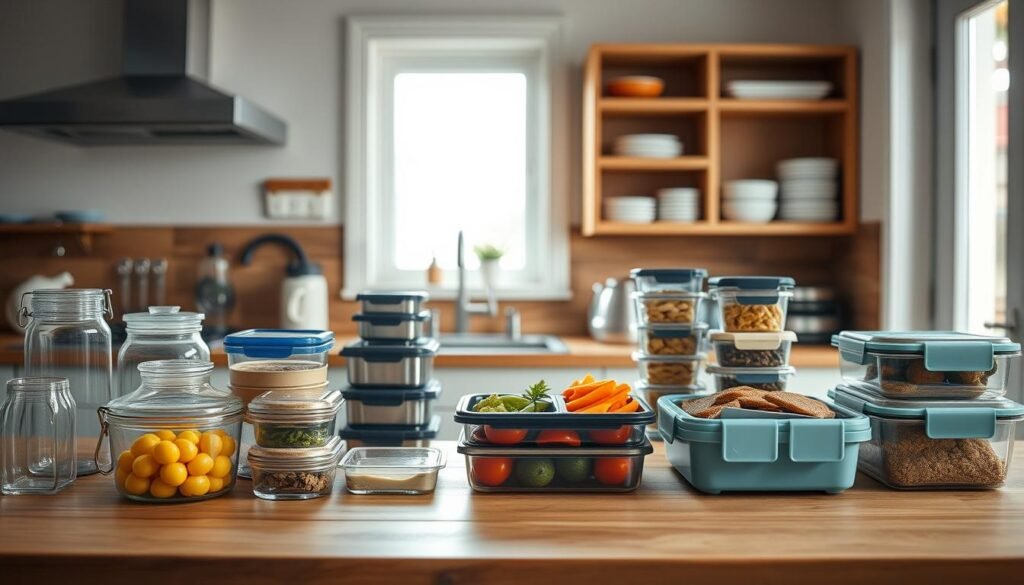
Nothing derails your nourishment plan faster than soggy greens or leaky dressings. The right storage system turns your fridge into an organized command center. One teacher client shared her “aha” moment: “When I switched to uniform containers, I regained 15 minutes daily just from not digging through mismatched lids.”
Your Fridge’s New Best Friends
Snapware’s stackable containers transformed how I store roasted veggies and chickpea salads. Their airtight seals keep cauliflower rice fresh for 4 days, while divided compartments prevent avocado slices from turning lunches mushy. Look for these features:
- Clear walls to spot that lemon herb sauce instantly
- Freezer-to-microwave durability for stress-free reheating
- Write-on lids to track prep dates (“Tuesday’s salmon bowls”)
Busy parents love portioning snacks in ½-cup containers—perfect for carrot sticks or mixed nuts. For salads, layer dressings under crunchy toppings using tall jars. Pro tip: Store dressings in small silicone cups inside main containers to maintain crisp textures until eating.
Real-world success: A nurse I coach uses color-coded lids—blue for proteins, green for veggies. This lets her grab balanced plates in seconds during hectic shifts. Remember, good storage isn’t just about freshness—it’s designing a system that makes daily choices effortless.
Nutritional Balance and Flavor Enhancements
Transform ordinary dishes into vibrant experiences by marrying nutrition with bold flavors. A client recently shared her breakthrough: “When I started adding za’atar to roasted carrots, my kids asked for seconds every time.” This proves healthy eating doesn’t mean sacrificing taste—it’s about smart pairing.
Infusing Meals with Herbs, Spices, and Sauces
Your spice rack holds endless possibilities. Whip up a lemon-tahini sauce in minutes: blend tahini, garlic, and citrus for drizzle-worthy magic. One teacher uses this on grain bowls and as a veggie dip. Try these combos:
| Ingredient | Flavor Profile | Meal Uses |
|---|---|---|
| Smoked paprika | Earthy warmth | Roasted veggies / Soups |
| Fresh basil | Bright herbal | Salads / Pasta |
| Chili crisp | Spicy crunch | Stir-fries / Eggs |
Balancing Nutrition With Taste
Boost salads with protein-packed chickpeas tossed in cumin and lime. For roasted sweet potatoes, sprinkle nutritional yeast instead of salt. A nurse I coach keeps pre-mixed spice jars labeled “Mediterranean” and “Tex-Mex” for instant upgrades.
Revive leftovers by adding fresh elements—toss yesterday’s quinoa with parsley and toasted almonds. Remember: bold flavors thrive in simplicity. As one parent noted, “A squeeze of lemon makes even basic steamed greens exciting.”
Want more ideas? Share your kitchen wins and discover how others balance nourishment with crave-worthy tastes.
Leftover Magic: Reinventing Your Dishes
Your refrigerator holds hidden treasures waiting for creative reinvention. Last night’s dinner becomes today’s blank canvas—all it needs is fresh perspective and smart tweaks. I’ve seen clients transform basic components into showstopping midday nourishment through clever repurposing.
From Evening Fare to Midday Spark
A client recently shared her breakthrough: “Tuesday’s rosemary-roasted chicken becomes Wednesday’s power salad with massaged kale and toasted pecans.” She simply shreds remaining protein, tosses with crisp veggies, and adds a bright lemon-tahini drizzle. This approach saves 15 minutes daily while keeping flavors exciting.
Grains like quinoa shine in multiple roles. Monday’s dinner side becomes:
- Tuesday’s breakfast bowl base with almond butter and berries
- Thursday’s veggie burger binder with mashed beans
- Friday’s soup thickener with roasted garlic broth
Three rules for successful transformations:
- Keep core flavors consistent (Italian herbs stay Italian)
- Add one fresh textural element (crunchy veggies, crispy toppings)
- Change the format (bowl → wrap → salad)
Batch-roasted sweet potatoes demonstrate this perfectly. Use them in:
| Meal | Transformation | Add-Ons |
|---|---|---|
| Breakfast | Hash with eggs | Avocado slices |
| Lunch | Grain bowl base | Pickled onions |
| Snacks | Dipped in hummus | Everything bagel seasoning |
Designate Thursday as your “remix day” to creatively use lingering ingredients. As one parent told me: “Our leftover fried rice becomes tomorrow’s stuffed peppers—my kids think it’s magic!”
Adapting Meal Prep to a Busy Lifestyle
Mornings often feel like a race against the clock. But with smart strategies, chaos transforms into calm. One working parent told me their secret: “I treat my kitchen like a pit crew—everything’s prepped to fuel our day in minutes.”
Quick Breakfasts, Snacks, and Lunch Assemblies
Start with grab-and-go breakfasts. Whip up egg muffins Sunday night—mix beaten eggs with spinach and feta, bake in muffin tins. Pair with pre-portioned fruit cups for instant morning fuel. A teacher client stores these in her car’s cooler bag for commute-friendly nourishment.
Snack smarter with pre-assembled kits:
| Meal | Prep Idea | Time Saved |
|---|---|---|
| Breakfast | Overnight oats jars with chia seeds | 5 minutes |
| Snack | Veggie sticks + single-serve hummus | 2 minutes |
| Lunch | Pre-cooked chicken wrap stations | 3 minutes |
Use roasted sweet potatoes three ways: breakfast hash, salad toppers, or blended into smoothies. Keep dressings in squeeze bottles for instant flavor upgrades. One nurse lines containers with parchment paper—she layers ingredients vertically for mess-free assembly.
Remember: efficiency thrives in simplicity. Batch-cook two proteins weekly—try shredded turkey and marinated tofu. Store in labeled deli containers for fast access. As a busy dad shared, “Our 7 PM scramble became 7 PM family time—all thanks to pre-chopped stir-fry kits.”
Exploring New Recipes and Maintaining Variety
Ever feel like your go-to dishes need a refresh? Seasonal shifts offer natural inspiration to revitalize your routine. I recently challenged a client to swap her usual rice for roasted cauliflower in tacos—she now claims it’s her family’s most-requested dish.
Seasonal Inspirations and Unique Ingredient Uses
Summer’s bounty sparks creativity. Try grilled peaches in spinach salads or blend fresh basil into avocado dressing. One food blogger shares:
“Roasted strawberries add unexpected sweetness to quinoa bowls—it’s like dessert for dinner!”
Winter calls for cozy twists. Simmer butternut squash into creamy sauces or fold mashed sweet potato into breakfast muffins. These small changes keep taste buds engaged without overhauling your system.
| Season | Ingredient | New Use |
|---|---|---|
| Spring | Asparagus | Blend into pesto |
| Summer | Zucchini | Spiralize into noodles |
| Fall | Apples | Roast with chicken |
| Winter | Kale | Crisp into chips |
Start with one weekly experiment. A parent told me their breakthrough: “We tried lemon-tahini roasted chickpeas—now they’re our favorite salad topper.” Track successes in a kitchen journal to build your personal recipe arsenal.
Remember: variety thrives in simplicity. Swap sauces first—try chimichurri instead of ranch. Use Pinterest boards for visual inspiration, but adapt recipes to your stocked ingredients. Your perfect system evolves through playful exploration.
Conclusion
Your kitchen journey evolves through small, intentional steps. Like my client who transformed basic roasted chicken into three distinct dinners, you can build flavorful variety without chaos. Structured planning becomes second nature when you focus on versatile ingredients and smart repurposing.
Batch-cooked grains and proteins fuel multiple dishes—think shredded turkey tacos today, curry salads tomorrow. Seasonal veggies add natural excitement, while strategic containers keep components fresh. One parent shared their win: “Pre-chopped stir-fry kits cut our dinner prep to 15 minutes.”
Remember, progress beats perfection. Start with two reliable recipes weekly, then experiment with bold sauces or texture contrasts. Leftovers become opportunities—yesterday’s quinoa revives with toasted almonds and citrus dressing.
Every efficient system began as trial-and-error. Celebrate what works, tweak what doesn’t, and share your discoveries. What kitchen hack will simplify your week? Drop your favorite tip in our community forum—let’s keep building smarter nourishment habits together.

